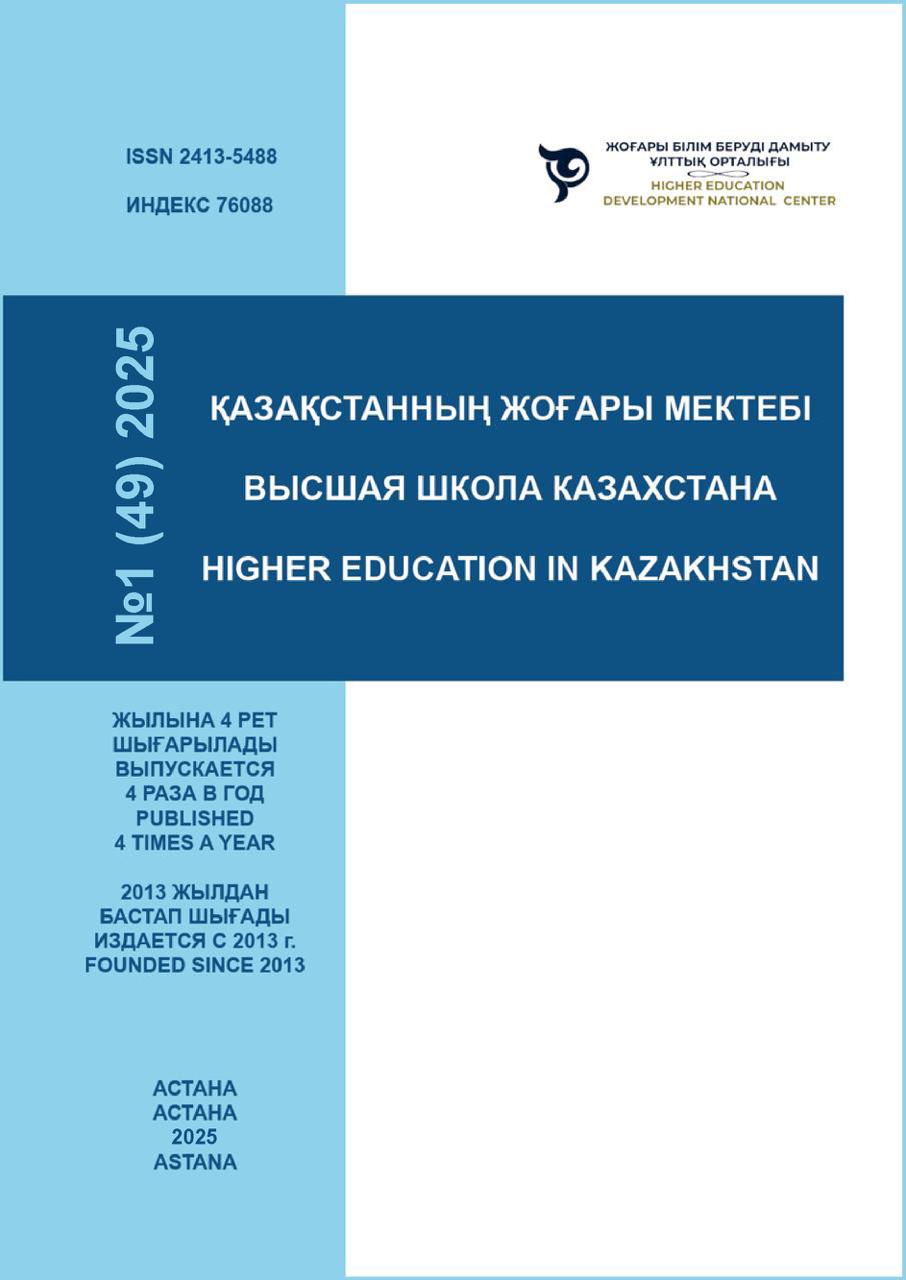MODEL OF PSYCHOLOGICAL AND PEDAGOGICAL GUIDANCE FOR UNIVERSITY STUDENTS’ SOFT SKILLS DEVELOPMENT
DOI:
https://doi.org/10.59787/2413-5488-2025-49-1-93-104Аңдатпа
In the context of dynamic changes in the economy and rapid technological progress, the process of developing soft skills is becoming an integral condition for the professional success of graduates of education institutions. This study aimed to create and substantiate from a scientific point of view a model of psychological and pedagogical guidance that promotes the development and strengthening of soft skills in university students. The study employed a comprehensive methodological approach, including a theoretical analysis of scientific and methodological sources, systematization of data, empirical study through a sociological survey of employers and HR specialists in the Pavlodar region (75 respondents), and modeling aimed at developing a scientifically based model of psychological and pedagogical guidance for soft skills development in university students. Particular attention is given to skills such as teamwork, creativity, critical thinking, problem-solving, and emotional intelligence. The developed model is an integrated structure that includes target, methodological, diagnostic, content, organizational, and result-oriented components. Each of these components is aimed at creating a favorable educational environment that helps strengthen the professional competitiveness of students and develop their personal stability and ability to successfully adapt to a dynamically changing labor market. The model presents programs focused on the systematic and effective development of soft skills, providing a comprehensive approach to this process through the integration of innovative methods, various forms of training and modern educational resources. Thus, the model focuses on creating an educational space that stimulates the development of soft skills and assumes active participation of all subjects in the educational process.
Әдебиеттер тізімі
Abraham, T. H., Stewart, G. L., & Solimeo, S. L. (2021). The importance of soft skills development in a hard data world: learning from interviews with healthcare leaders. BMC medical education, 21, 1-7.
Caeiro-Rodríguez, M., Manso-Vázquez, M., Mikic-Fonte, F. A., Llamas-Nistal, M., Fernández-Iglesias, M. J., Tsalapatas, H., ... & Sørensen, L. T. (2021). Teaching soft skills in engineering education: An European perspective. IEEE Access, 9, 29222-29242.
Caeiro-Rodríguez, M., Manso-Vázquez, M., Mikic-Fonte, F. A., Llamas-Nistal, M., Fernández-Iglesias, M. J., Tsalapatas, H., ... & Sørensen, L. T. (2021). Teaching soft skills in engineering education: An European perspective. IEEE Access, 9, 29222-29242.
Cheng, M., Adekola, O., Albia, J., & Cai, S. (2022). Employability in higher education: a review of key stakeholders' perspectives. Higher Education Evaluation and Development, 16(1), 16-31.
Cimatti, B. (2016). Definition, development, assessment of soft skills and their role for the quality of organizations and enterprises. International Journal for Quality Research, 10(1), 97–130.
Coelho, M. J., & Martins, H. (2022). The future of soft skills development: a systematic review of the literature of the digital training practices for soft skills. Journal of E-learning and Knowledge Society, 18(2), 78-85.
Eleje, L. I., Onuigbo, C. F., Metu, I. C., Ejinkonye, F. O., & Enemouh, U. S. (2024). Influence of Secondary School Students’ Use of Calculators on their Numerical Skills. Futurity of Social Sciences, 2(3), 18-40.
Fakhretdinova, G. N., Osipov, P., & Dulalaeva, L. P. (2021). Extracurricular activities as an important tool in developing soft skills. In Educating Engineers for Future Industrial Revolutions: Proceedings of the 23rd International Conference on Interactive Collaborative Learning (ICL2020), Volume 2 23 (pp. 480-487). Springer International Publishing.
Garcia, I., Pacheco, C., Méndez, F. & Calvo‐Manzano, J. A. (2020). The effects of game‐based learning in the acquisition of “soft skills” on undergraduate software engineering courses: A systematic literature review. Computer Applications in Engineering Education, 28(5), 1327-1354.
Glazunova, O. G., Korolchuk, V. I., Voloshyna, T. V., & Vakaliuk, T. A. (2022). Development of soft skills in computer science bachelors in the project learning process. Information Technologies and Learning Tools, 92(6), 111.
Lamri, J. & Lubart, T. (2023). Reconciling hard skills and soft skills in a common framework: the generic skills component approach. Journal of Intelligence, 11(6), 107.
Maren, M. S., Salleh, U. K. M., & Zulnaidi, H. (2021). Assessing prospective teachers’ soft skills curriculum implementation: Effects on teaching practicum success. South African Journal of Education, 41(3).
Marin-Zapata, S. I., Román-Calderón, J. P., Robledo-Ardila, C., & Jaramillo-Serna, M. A. (2022). Soft skills, do we know what we are talking about? Review of Managerial Science, 16(4), 969-1000.
Rozhnova, T., Sholokh, O., Tymoshko, H., Yakymenko, S., & Volotovska, T. (2024). The Future of Soft Skills Training:: Innovations in the Higher Education System. Cadernos
Sancho-Cantus, D., Cubero-Plazas, L., Botella Navas, M., Castellano-Rioja, E. & Cañabate Ros, M. (2023). Importance of soft skills in health sciences students and their repercussion after the COVID-19 epidemic: Scoping review. International journal of environmental research and public health, 20(6), 4901.
Sirbu, A., & Georgescu, M. (2023, September). English Classes as a Intrinsic Part of the Soft Skills Development of Marine Students. In IMLA 28/IMEC 33 Conference Proceedings (pp. 86-92).
The Workforce of the Future: Youth in the Labor Market of Kazakhstan. Workforce Development Center, 2023. https://erdo.enbek.kz/storage/news_files/Нацдоклад%20русс.pdf.
Tongia, S. & Jain, D. C. (2024). The relevance of soft skills in career success. Educational Administration: Theory and Practice, 30(1), 1809-1812.
Uaikhanova, M. A., Pshembayev, M. A., Tulkina, R. Zh. & Krykbayeva, M. S. (2024) Diagnostic tools for studying soft skills of university students. Bulletin of Toraighyrov University. Pedagogical Series, 4, 245-255.
Uvarina, N. V., Korneeva, N. Yu. & Mikryukov, Yu. V. (2021). Soft skills: relevance, history, development prospects. Professional education in Russia and abroad, 4 (44), 40-46.

Жүктеулер
Жарияланды
Журналдың саны
Бөлім
Лицензия
Авторлық құқық (c) 2025 "Қазақстанның жоғары мектебі" ғылыми-сараптамалық журналы

Бұл жұмыс Creative Commons Attribution-Коммерциялық емес 4.0 халықаралық лицензиясы.





